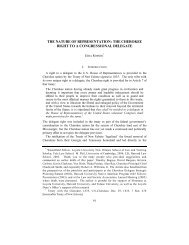Climbing Above the Culture Clash
Climbing Above the Culture Clash
Climbing Above the Culture Clash
Create successful ePaper yourself
Turn your PDF publications into a flip-book with our unique Google optimized e-Paper software.
KS: The students were happy with it, and<br />
I thought it was a great success. We had a<br />
great line-up of speakers, and <strong>the</strong> students<br />
worked incredibly hard. They gained<br />
an understanding of a scholar’s process,<br />
something traditional courses can’t deliver.<br />
This is what we had hoped to accomplish.<br />
Q: Who participated in last<br />
semester’s course<br />
LM: We had 15 students, including one<br />
graduate student in political science. It was<br />
mostly female students, but we had two male<br />
students. Any professors who wanted to<br />
attend were also welcome; we probably had<br />
anywhere from two to five professors come to<br />
each session.<br />
Q: What was <strong>the</strong> format of <strong>the</strong><br />
colloquium<br />
KS: We met with students <strong>the</strong> week before<br />
<strong>the</strong> speaker would come, and we would<br />
talk about <strong>the</strong> paper that was going to be<br />
presented. Students were encouraged to think<br />
about <strong>the</strong> author’s decision-making: both<br />
decisions about focus, coverage and scope,<br />
as well as how <strong>the</strong> particular paper fit into<br />
<strong>the</strong> larger research agenda. During class,<br />
students could engage <strong>the</strong> speaker about those<br />
decisions.<br />
LM: We would put <strong>the</strong> work in context, if<br />
necessary — for example, we would explain<br />
its connection to certain gender and law<br />
debates or issues. We would give students a<br />
chance to discuss <strong>the</strong> points <strong>the</strong>y raised in<br />
<strong>the</strong>ir weekly reaction papers. If we saw certain<br />
common <strong>the</strong>mes in <strong>the</strong> reaction papers, we<br />
would invite <strong>the</strong> students to discuss <strong>the</strong>m.<br />
Q: How does this seminar add to<br />
someone’s understanding of <strong>the</strong> law<br />
LM: Examining <strong>the</strong> underlying assumptions<br />
being made helps people better understand<br />
<strong>the</strong> law and policy arguments. For example,<br />
one of our speakers, Professor Elizabeth<br />
Emens of Columbia University, was looking<br />
at how people use arguments about nature,<br />
ei<strong>the</strong>r as a reason why we can’t really change<br />
things or as a reason why we have to change<br />
things. She explored disability, sexual<br />
orientation, gender, race and aging. And I<br />
think once students read that paper, it gave<br />
<strong>the</strong>m some new tools for thinking about how<br />
people have certain assumptions about what<br />
<strong>the</strong> proper role of law is.<br />
Q: Who are some of <strong>the</strong> outside<br />
speakers who have served as experts<br />
for this colloquium, and how were<br />
<strong>the</strong>y selected<br />
LM: We tried in <strong>the</strong> first instance to go with<br />
some local people. We have a large number<br />
of law schools in <strong>the</strong> Boston area, and we<br />
also have some wonderful people here at<br />
<strong>the</strong> University. We had <strong>the</strong> dean of <strong>the</strong><br />
College of Arts and Sciences, Gina Sapiro,<br />
[who presented her paper “The Gender<br />
Basis of American Social Policy.”] O<strong>the</strong>r<br />
speakers included Harvard Law School<br />
Professor Jeannie Suk, who analyzed how<br />
gender, privacy and <strong>the</strong> home feature in <strong>the</strong><br />
Supreme Court’s Fourth Amendment cases,<br />
and Nor<strong>the</strong>astern Professor Martha Davis,<br />
who presented her paper “Welfare, Work<br />
and Education.” We also took advantage of<br />
opportunities where a well-known scholar<br />
was coming to <strong>the</strong> law school for ano<strong>the</strong>r<br />
reason and was willing to participate in<br />
our colloquium. We will do that again this<br />
semester when Professors Anita Allen [of<br />
<strong>the</strong> University of Pennsylvania] and Kim<br />
Scheppele [of Princeton] visit BU. Last<br />
semester, we had Professor Reva Siegel, a<br />
leading legal historian at Yale, present recent<br />
work on how opponents of abortion have<br />
adopted pro-choice rhetoric about women’s<br />
rights to argue that abortion harms women.<br />
[She also presented] a work in progress on<br />
recovering <strong>the</strong> history of <strong>the</strong> early abortion<br />
rights movement.<br />
KS: We were trying to make sure that we<br />
invited speakers with a range of different<br />
expertise, so we looked for history, political<br />
science, social policy and literature, for<br />
example. We also wanted a variety of topic<br />
coverage, so <strong>the</strong>re were some scholars who<br />
spoke about <strong>the</strong> lives of low-income women,<br />
some about reproductive rights, some about<br />
marriage, some about disability, some about<br />
transgendered issues. … [Wellesley Professor]<br />
Diana Williams talked about interracial<br />
marriage during <strong>the</strong> Reconstruction period in<br />
New Orleans and <strong>the</strong> laws addressing it.<br />
Q: What is your background in <strong>the</strong><br />
subject area<br />
KS: I have taught a Women & Law class and<br />
a Women, Work & Families class for many<br />
years. I have a longstanding interest in <strong>the</strong><br />
way law perceives women’s roles, and <strong>the</strong> way<br />
cultural understandings of women’s roles are<br />
reflected in <strong>the</strong> law.<br />
I have written at length about <strong>the</strong> way<br />
law captures and fails to capture <strong>the</strong> value<br />
generated by women’s domestic labor. I also<br />
have written about <strong>the</strong> ways urban planning,<br />
26 Fall | 2009 Boston | University The Record School | 26 of Law | www.bu.edu/law









